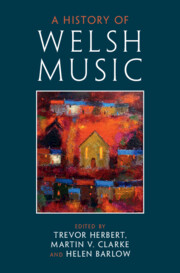Book contents
- A History of Welsh Music
- A History of Welsh Music
- Copyright page
- Contents
- Figures
- Maps
- Music Examples
- Contributors
- Preface
- Acknowledgements
- Glossary
- Maps
- Chapter 1 Music in Welsh History
- Chapter 2 Words for Music
- Chapter 3 Music in Worship before 1650
- Chapter 4 Secular Music before 1650
- Chapter 5 The Eisteddfod Tradition
- Chapter 6 Women and Welsh Folk Song
- Chapter 7 Instrumental Traditions after 1650
- Chapter 8 The Celtic Revival
- Chapter 9 Musical Communications in the Long Nineteenth Century
- Chapter 10 Nonconformists and Their Music
- Chapter 11 Professionalisation in the Twentieth Century
- Chapter 12 Composing Cymru
- Chapter 13 Traditions and Interventions
- Chapter 14 New Traditions
- Chapter 15 Singing Welshness
- Chapter 16 Postscript
- Book part
- Bibliography
- Index
Chapter 15 - Singing Welshness
Sport, Music and the Crowd
Published online by Cambridge University Press: 08 September 2022
- A History of Welsh Music
- A History of Welsh Music
- Copyright page
- Contents
- Figures
- Maps
- Music Examples
- Contributors
- Preface
- Acknowledgements
- Glossary
- Maps
- Chapter 1 Music in Welsh History
- Chapter 2 Words for Music
- Chapter 3 Music in Worship before 1650
- Chapter 4 Secular Music before 1650
- Chapter 5 The Eisteddfod Tradition
- Chapter 6 Women and Welsh Folk Song
- Chapter 7 Instrumental Traditions after 1650
- Chapter 8 The Celtic Revival
- Chapter 9 Musical Communications in the Long Nineteenth Century
- Chapter 10 Nonconformists and Their Music
- Chapter 11 Professionalisation in the Twentieth Century
- Chapter 12 Composing Cymru
- Chapter 13 Traditions and Interventions
- Chapter 14 New Traditions
- Chapter 15 Singing Welshness
- Chapter 16 Postscript
- Book part
- Bibliography
- Index
Summary
The chapter examines the relationships between music, sport and Welsh identity. Focusing on the national rugby union and football teams, it explores the ways in which performances of ‘Mae Hen Wlad Fy Nhadau’ by players and supporters have contributed to a cohesive sense of national identity. Examples range from its first recorded use prior to the rugby team’s famous victory over the New Zealand All Blacks in 1905 to its part in the Football Association of Wales’s efforts to galvanise supporters during the team’s successful Euro 2016 campaign. It also considers the adoption of popular hymns such as ‘Guide Me, O Thou Great Jehovah’ and ‘Calon Lân’ by supporters, investigating the extent to which affiliation to the national team takes on a spiritual quality. Drawing on the contributions of popular Welsh artists such as Max Boyce, the chapter also assesses the self-referential nature of connections between musicality and sporting pride in corporate expressions of national identity. It considers the ways in which language, religious practice and social structures encouraged and maintained a culture of massed patriotic singing, and how this has been reimagined and perpetuated in the twenty-first century through a combination of institutional support, technological developments and the influence of social media.
- Type
- Chapter
- Information
- A History of Welsh Music , pp. 332 - 354Publisher: Cambridge University PressPrint publication year: 2022
- 1
- Cited by



